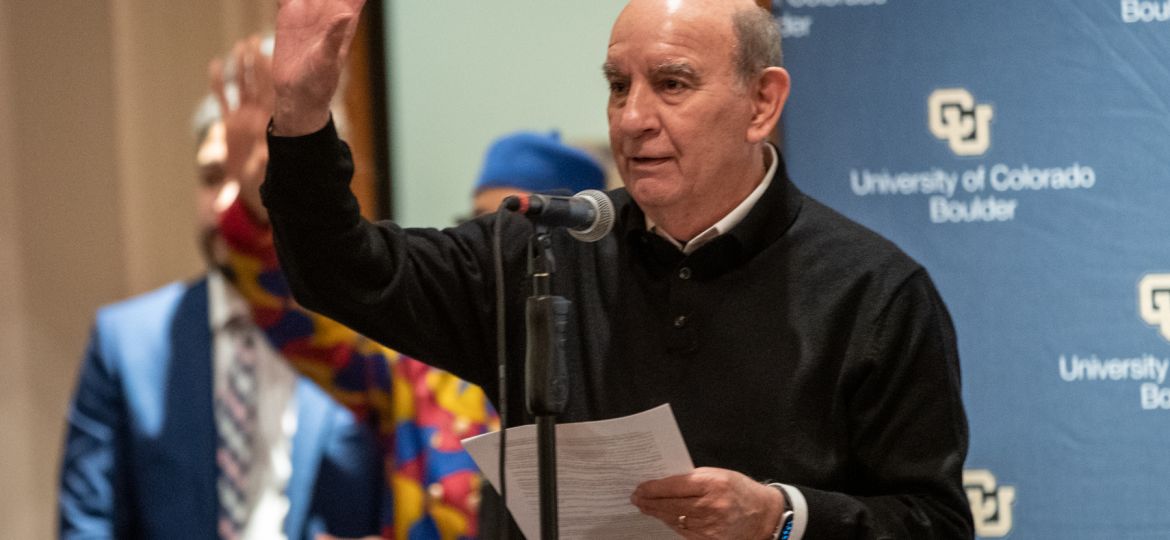
Search Committee Eyes Late March To Announce CU Boulder Chancellor Finalists
After two months of recruitment, the University of Colorado’s search committee for a new Boulder chancellor is preparing to interview candidates for the top campus job.
Chancellor Philip DiStefano announced he would step down from the role he’s held for almost 15 years in late September. The university system then formed a group of 21 campus stakeholders who have led the hunt for DiStefano’s replacement.
More than half of the search committee members are university staff, faculty or students. All have signed non-disclosure agreements relating to their involvement in the search process.
“February is really the time when the rubber hits the road for the committee,” said Danielle Radovich Piper, the committee’s chair and the university system’s senior vice president of external relations.
This month, committee members hold a meeting to select candidates, conduct interviews and deliver a shortlist of half a dozen names to CU System President Todd Saliman for further consideration.
Radovich Piper said university leadership hopes to announce the finalists, or finalist, for the position the week of March 18.
“But that’s an ideal timeline. You never know what can happen during these processes,” she said.
New year priorities
When the search process first began, system leaders thought they were already behind some other prominent universities that had begun similar leadership searches that year. As a result, the committee has moved quickly to pick candidates.
“We were a little worried that we were a little late in the game,” Radovich Piper said. “But I think we’re seeing that it’s probably been a good thing that we’ve moved as quickly as we have because we’re in the mix.”
The committee has been aided by an executive search firm, AGB Search, which helps the university collect applications and solicit community feedback on the process. The firm kicked off the year with a series of listening sessions at CU Boulder, each intended for specific campus interest groups.
Committee and firm members heard from students, faculty and staff who shared their hopes for CU Boulder’s next leader. Radovich Piper said community members wanted environmentalism, diversity, athletics and student support to be priorities for the incoming chancellor.
“A measure of success from my point of view would be that the new chancellor actually puts resources behind some of the goals of the university,” said one participant at a university staff listening session on Jan. 17. “Not just words, but commitments of resources.”
In October, Chancellor DiStefano told the Boulder Faculty Assembly he hoped his replacement would be an academic leader, according to CU Boulder Today. The university’s position profile says applicants need a doctorate or terminal degree sufficient to be granted tenure at CU Boulder.
“There probably are folks on the committee who also share [DiStefano’s] sentiment,” Radovich Piper said.
But who finally ends up as CU Boulder’s next chancellor ultimately won’t be up to committee members. That’s a call made by System President Saliman.
Past searches caused controversy
In December, President Saliman caused some controversy when he selected Jennifer Sobanet as chancellor of the University of Colorado’s Colorado Springs campus. Sobanet was not one of the finalists the UCCS search committee had announced as the top candidates for the job.
Radovich Piper said she doesn’t expect the outcome of CU Boulder’s search to be similar to the one at UCCS. Sobanet was serving as interim chancellor at the Colorado Springs campus, and UCCS faces financial challenges, low enrollment and high staff turnover.
“Since the circumstances are different, I don’t anticipate there being a replication here,” she said. “I don’t think the president does either.”
The two most recent university system presidents, Saliman and Mark Kennedy, were scrutinized after no other candidates were named as their competitors.
“Some applicants may or may not want to be a part of a pool of that many [people],” Radovich Piper said. “If it’s one or two, or maybe three, that’s one thing. But once you start getting more than that, you start having applicants say, ‘I don’t know if I want to do that.’
DiStefano was also named the sole finalist of CU Boulder’s 2009 chancellor search.
Ryan Biehle was on the committee that selected DiStefano, who was then interim chancellor, in 2009. Biehle was a CU Boulder Student Government tri-executive at the time and is now the CEO of the Colorado Academy of Family Physicians.
“It was really identifying strong candidates and evaluating those candidates for a variety of characteristics and then putting forward one or several recommendations to the president on who he should consider hiring,” he said.
One of DiStefano’s characteristics made him stand out among other candidates, Biehle said.
“I’m very glad that he ended up staying in the role for over a decade,” he said. “I think that was one of the things that I was looking for, somebody who would be willing to be in it for the long haul.”
But DiStefano’s long tenure at CU Boulder, which started in 1974, may not be replicated by his successor. Senior university leaders seldom stay in a job for more than six or seven years, according to AGB Search CEO Rodrick McDavis.
“Serving 15 years, double-digit years of service are going to become extinct and part of that is because of the nature of the job,” McDavis said at the Jan. 17 listening session. “If you get a president or chancellor who stays five years, that’s pretty good.”
More details about the university’s description of the role and the search process can be found here.

